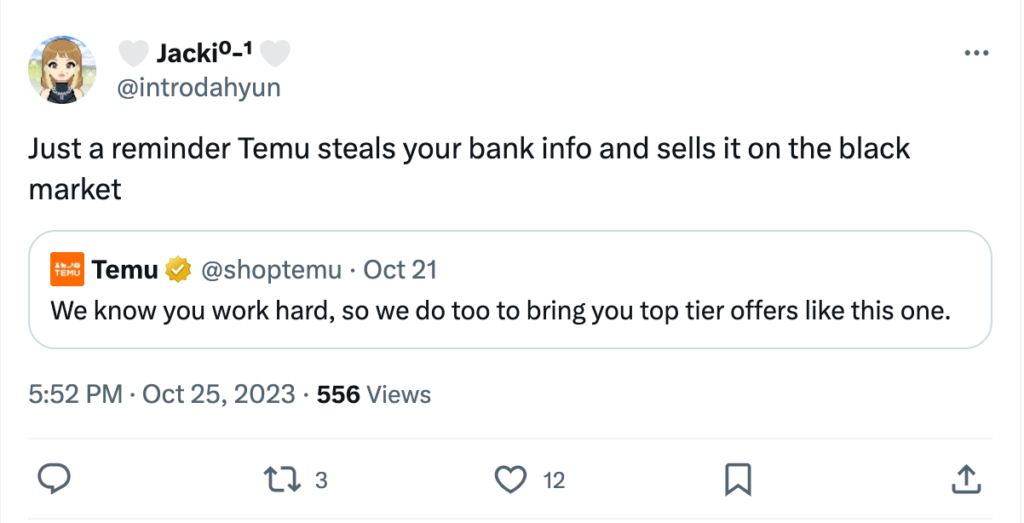Is the Temu website a threat to governments in the West?

• The Temu website is being watched by the US Government.
• Temu has been investigated over its data use policies.
• The real question about the Temu business model may not be data-related.
Should governments consider the Temu website the latest threat to the West? In the US, the government is sitting up and taking notice of the e-commerce site that’s taking the internet by storm, asking one crucial question – is the Temu website, which spends huge amounts on advertizing, actually just a front for Chinese data harvesting?
The Temu website and app launched in the US in 2022, expanding to Canada earlier this year, followed by Europe and, most recently, New Zealand and Australia. The site quickly become a market leader and topped app charts in multiple countries.
In many ways, its popularity makes sense, rather than being inherently suspicious; the appeal of a seemingly limitless range of items at incredibly low prices can’t be overstated when inflation is causing costs to skyrocket across the world.
An outdoor tent goes for $2 on the Temu website, and is well-reviewed – dispelling any assumptions that low price=low quality. Or, in the case of a tent, that low protection from the elements.
During the Black Friday sales last year, the site earned the nickname “the price butcher.” While initially a disturbing image, as inflation bites, the price butcher becomes a more attractive option for more shoppers.
The total value of products sold on the site has gone from US$3m in September 2022 to US$400m in April 2023 – so the price butchery is having a distinctly positive effect.
Given the low prices though, analysts are wondering how on earth the company manages to turn that kind of profit – ans subsequently, how long Temu’s business model can survive?

Is it a bird? Is it a plane? No, it’s SuperTemu! Or… is it?
It would be lovely to believe that, like a superhero in a nation’s time of need, Temu has arrived to slash prices and fight off the idea that when money is tight, consumers have to slow down. Truth! Justice! The Capitalist Way!
The app and website themselves are sensory overload rendered in coding, screaming promotions and offers at every click. By referring friends, users can earn rewards – some shoppers have used referral rewards to order numerous items without paying a penny.
The platform tells users to “shop like a billionaire,” gamifies the whole experience with interactive prize wheels and reward systems, and uses countdown timers, rolling lightning sales and deals.
All of these things are red flags for addictiveness, although everyone is reeled in – one Australian shopper said, “They make the whole thing feel like a scam, even though I don’t think it is.”
Issues of mass consumerism and waste aside, we have to wonder what the catch is. The Temu website feels like a scam. Surely something must be wrong with it. Surely?

A countdown for free shipping, pre-Black Friday sales and 90% reductions – hard to take it all in?
On the surface of it, “right now, Temu does not care much about breaking even,” says Ivy Yang, founder of Substack Calling the Shots, and Wavelet Strategy. “Its primary competitive advantage is in selling products as cheaply as possible. The platform is laser-focused on capturing customer mindshare.”
Part of capturing that mindshare means capturing the market of its closest rival, Shein. Half of the latter’s market share was taken by Temu when it went worldwide and both sites are currently embroiled in a US-based legal battle.
Both companies have sued each other over alleged anti-trust activity. Shein says Temu misled consumers to believe they were the same brand. Temu says Shein used “exclusionary practices” including making suppliers sign exclusivity contracts that Temu says hindered its commercial growth.

Shein and Temu are very similar…
Each deny the allegations against them made by the other.
Temu does run in a very similar way to Shein, offering products directly from suppliers who make short production runs in response to demand. However, while Shein directly contracts suppliers, Temu acts as more of a bridge to consumers: suppliers can focus on production, while the platform manages listings, marketing and logistics.
That means that sellers “relinquish control over pricing, return policies, and long-term sales growth planning,” says Yang. “Under this model, Temu’s duration of payments to sellers is notably longer, and the cashflow pressures fall on sellers, not the platform.”
The little interest Temu seemingly has in profit margins makes more sense once that piece of the puzzle is established, at least.
Temu’s online ubiquity is not an accident. The company is investing nearly US$500m into marketing and promotions every quarter.
“That’s $2bn a year to power all the social media ads, display banners, and paid searches, all geared towards aggressively expanding its customer base,” says Yang.
Fine. But where’s all that cash coming from?
Temu is owned by multinational commerce group PDD Holdings, which was founded by Chinese billionaire Colin Huang.
It’s the sister site of the Chinese e-commerce platform Pinduoduo, which was valued at $200 billion in 2021, according to the Financial Times.
Temu is headquartered in Boston, probably to avoid the current global data security panic that affects any and all of China’s output.
Analysts say Temu doesn’t appear to collect any more user data than Amazon or Ebay, but it isn’t transparent about its security testing and data safety.

(Unverified claims) Everyone’s pretty suspicious…
The app was temporarily suspended from Apple stores earlier this year after Apple found it was misleading users about its use of their data, according to Politico. Apple though says its transparency concerns were resolved in July.
Spying and data misuse claims aside, Temu’s rise (and that of Shein) has had major effects on the e-commerce industry. According to Yang, Temu’s aggressive social media advertizing has driven up the cost of ads inventory for everyone.
Sunandan Ray, chief executive of global shipping company Unique Logistics, says the huge volume of shipping from the Temu website is taking up more of the limited export space out of China, and driving up prices.
“Everyone who is importing by air is paying a higher price now because of the loss of capacity,” he said. “To a certain extent it might be getting passed on to consumers, or it might be squeezing the margins of sellers.”
30% of small packages coming into the US from China are from Shein and Temu, according to a report by the US House Select Committee on the Chinese Communist Party.
Republican senator and committee chair Mike Gallagher said “Temu and Shein are building empires around the de minimis loophole in our import rules – dodging import taxes and evading scrutiny on the millions of goods they sell to Americans.”

Chairman Mike Gallagher, Feb. 28, 2023. (AP Photo/J. Scott Applewhite)
The US has previously raised concerns that Shein and Temu’s rapid growth has been aided by “exploitation” of current US law, which exempts packages worth less than $800 from customs duties.
Together, the two firms are responsible for nearly 600,000 packages worth less than $800 being shipped to the US each day, according to the report.
Temu and Shein make heavy use of the de minimis rule, since the shipping method allows retailers to sell goods to consumers at cheaper prices because they aren’t subject to duties, taxes or government fees that apply to typical retailers shipping overseas in bulk.
Between 2016 and 2021, the number of de minimis packages entering the US tripled and hit 720 million.
More dubiously, de minimis shipping requires far less information to be disclosed about the products and companies involved in the transaction, making it harder for US customs officials to detect packages containing narcotics, counterfeits and goods made with forced labor.
The June report further accused Temu of avoiding sanctions under the US’s Uyghur Forced Labor Prevention Act (UFLPA), which restricts some Chinese goods linked to human rights abuses in Xinjiang.
“Temu is doing next to nothing to keep its supply chain free from slave labour,” said Gallagher.
“American consumers should know that there is an extremely high risk that Temu’s supply chains are contaminated with forced labor,” the House Select Committee on the Chinese Community Party said in its report.
“Temu does not have any system to ensure compliance with the Uyghur Forced Labor Prevention Act (UFLPA). This all but guarantees that shipments from Temu containing products made with forced labor are entering the United States on a regular basis,” it said.
Temu told the committee that it had a reporting system that consumers and sellers could use to file complaints, and that it asked its sellers to sign a code of conduct specifying a “zero-tolerance policy” for the use of forced, indentured or penal labor. Temu’s code of conduct also says the company reserves the right to inspect factories and warehouses to ensure compliance.
But the code does not mention Xinjiang or the US ban, and Temu told the House Committee that it did not prohibit vendors from selling products made in Xinjiang, the report said.
With more than 80,000 suppliers, it’s hard to believe Temu properly vets every seller.
So: is Temu a threat to the West?
Maybe. Not in the US government’s typical “China uses companies as a front to spy on us” way, but in the sense that it’s not exactly a force for good.
It’s a more pressing threat to the people (not in the West) manufacturing the items that it sells for so little money. If not outright forced labor, it’s got to be severely underpaid. Temu might not directly do the manufacturing, but it has established a huge market for it, without sufficient guardrails to ensure exploitation doesn’t feature in the supply chain.
It’s grotesque how easily consumers are drawn in by the concept of quantity over not just quality but everything else, too. (Truth! Injustice! The Capitalist Way?) In the face of a potential bargain, all critical thinking goes out of the window and yes, maybe the total cost hits triple digits, but look how much new stuff arrived in the post…
By adding the element of addiction into the mix, Temu holds its users in a precarious position: when it decides that turning a profit would be useful, how many will be in too deep to stop shopping?
Governments should worry about Temu and consider placing firmer controls on the rules it manages to exploit, not because it is Chinese or a data security risk, but because everything else it represents is incredibly sinister.










